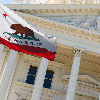SB 98, COVID-19 and Special Education: What's Next?

July 2020
Number 57
SB 98 is the recent Education Budget Trailer Bill signed into law by Gavin Newsom on June 29, 2020. Among other things, it was enacted to protect school funding from uncertainties caused by the COVID-19 pandemic. It makes important statutory changes to almost every area of education from labor and employment, to average daily attendance (ADA), Local Control Accountability Plan (LCAP), charter schools, and special education. This article focuses on SB 98’s impacts to special education in particular.
IEP Description for Emergency Conditions
Moving forward, all individualized education programs (IEPs) must now include a description of how services will be provided in future emergency conditions, like the COVID-19 physical school closures. Other examples of emergency conditions are explained in section 46392 of the Education Code and include fires, floods, and earthquakes, among other things. The emergency plan would go into effect in the event of a physical closure due to an emergency condition lasting more than 10 school days. The description should be developed by the IEP team and included in an IEP amendment or the next annual IEP.
The statement should include:
SB 98 significantly changed the funding formula for special education significantly. It repeals statutes related to prior funding programs and stops funding at the 2019-20 fiscal year’s levels for most add-on adjustments. The bill makes funding available for special education programs if revenues distributed are less than the estimated amount to fund those programs. It also creates a funding structure where Special Education Local Plan Areas (SELPAs) are provided with $625 per ADA rate or the ADA rate received in 2019-20, whichever is greater, and applies the cost-of-living adjustment (COLA) to future years to the statewide base rate. SB 98 does not provide COLA in the 2020-21 fiscal year. SB 98 also adds section 56122 and 56195.1 to the Education Code, which includes certain requirements for SELPAs. Some of the requirements include:
Considerations for Distance Learning
Importantly, the language of SB 98 requires in-person education, and authorizes distance learning in at least three stated circumstances: (1) where distance learning is necessary as a result of an order or guidance from a state or local public health officer; (2) for students who are medically fragile, or would be at-risk from in-person instruction; and (3) if a child is quarantining due to COVID-19 exposure. Districts may be able to offer distance learning in other circumstances as discussed more fully here. For students in special education, distance learning would necessarily include IEP services. For those special education students who are medically fragile, or self-quarantining, it may be prudent to consider offering distance learning, or some other remote educational program, to meet their needs in a safe and appropriate manner. The distance learning environment must include special education and related services required by the IEP, and accommodations, modifications, or supports necessary to ensure that an IEP can be implemented in a distance learning environment. IEP meetings may be necessary to discuss any potential changes in services necessary in a distance learning environment, or an IEP amendment may be offered if the local educational agency (LEA) and parent/guardian agree to make changes to an IEP without an IEP meeting.
In the event a LEA offered distance learning for the 2020 extended school year, the agency may claim an apportionment if the time value offered was equivalent to previous ESY requirements, including the minimum of 20 instructional days.
Considerations for Instructional Minutes
Where distance learning is offered, instructional minutes are to be calculated based on the time value of assignments as determined by the educational agency or certificated employee. For county offices of education operating special day classes, SB 98 additionally requires compliance with Education Code standards for minimum number of instructional days (see Ed Code 46200, et. seq.) and minimum number of instructional minutes, which depends on grade level (see Ed Code 46201). For all others, SB 98 modifies previous instructional minute requirements and should be carefully reviewed. You can read more about it here. LEAs should review their learning plans for the upcoming year to ensure compliance with IEPs. We also suggest LEAs coordinate with county offices for students who are or may be county placed, making sure any necessary changes are addressed by IEP teams.
Takeaways
SB 98 makes significant changes impacting special education. LEAs should consider whether changes are necessary in order to provide FAPE in light of a child’s circumstances. LEAs should consider creating IEP amendments if changes are necessary. Finally, LEAs should ensure contingency plans are clearly documented in IEPs and follow the requirements set forth in SB 98.
Due to the complexity of these issues and the overlapping impacts, we advise LEAs consult with legal counsel before making major programming changes. To read more about the impacts of SB 98, please refer to Lozano Smith’s concurrent Client News Briefs on the topics of charter schools, employee lay-offs CNB 55, distance learning CNB 56 and LCAP CNB 52.
If you have any questions about the special education implications of SB 98, or to discuss any legal matters pertaining to public agencies, please contact the authors of this Client News Brief or an attorney at one of our nine offices located statewide. You can also subscribe to our podcast, follow us on Facebook, Twitter and LinkedIn or download our mobile app.
Number 57
SB 98 is the recent Education Budget Trailer Bill signed into law by Gavin Newsom on June 29, 2020. Among other things, it was enacted to protect school funding from uncertainties caused by the COVID-19 pandemic. It makes important statutory changes to almost every area of education from labor and employment, to average daily attendance (ADA), Local Control Accountability Plan (LCAP), charter schools, and special education. This article focuses on SB 98’s impacts to special education in particular.
IEP Description for Emergency Conditions
Moving forward, all individualized education programs (IEPs) must now include a description of how services will be provided in future emergency conditions, like the COVID-19 physical school closures. Other examples of emergency conditions are explained in section 46392 of the Education Code and include fires, floods, and earthquakes, among other things. The emergency plan would go into effect in the event of a physical closure due to an emergency condition lasting more than 10 school days. The description should be developed by the IEP team and included in an IEP amendment or the next annual IEP.
The statement should include:
- the special education and related services the student will receive during the emergency period;
- any supplementary aides and services required to facilitate access during the emergency period;
- transition services under Education Code section 56345.1 as necessary; and
- extended school year services where appropriate.
SB 98 significantly changed the funding formula for special education significantly. It repeals statutes related to prior funding programs and stops funding at the 2019-20 fiscal year’s levels for most add-on adjustments. The bill makes funding available for special education programs if revenues distributed are less than the estimated amount to fund those programs. It also creates a funding structure where Special Education Local Plan Areas (SELPAs) are provided with $625 per ADA rate or the ADA rate received in 2019-20, whichever is greater, and applies the cost-of-living adjustment (COLA) to future years to the statewide base rate. SB 98 does not provide COLA in the 2020-21 fiscal year. SB 98 also adds section 56122 and 56195.1 to the Education Code, which includes certain requirements for SELPAs. Some of the requirements include:
- mandates use of a template to ensure compliance with Education Code sections 56195.1 and 56205;
- launches a moratorium on the establishment of single district SELPAs through the 2023-24 fiscal year;
- provides a two-year extension for SELPAs to include its annual assurances support plan for the education of all individuals with exceptions needs
Considerations for Distance Learning
Importantly, the language of SB 98 requires in-person education, and authorizes distance learning in at least three stated circumstances: (1) where distance learning is necessary as a result of an order or guidance from a state or local public health officer; (2) for students who are medically fragile, or would be at-risk from in-person instruction; and (3) if a child is quarantining due to COVID-19 exposure. Districts may be able to offer distance learning in other circumstances as discussed more fully here. For students in special education, distance learning would necessarily include IEP services. For those special education students who are medically fragile, or self-quarantining, it may be prudent to consider offering distance learning, or some other remote educational program, to meet their needs in a safe and appropriate manner. The distance learning environment must include special education and related services required by the IEP, and accommodations, modifications, or supports necessary to ensure that an IEP can be implemented in a distance learning environment. IEP meetings may be necessary to discuss any potential changes in services necessary in a distance learning environment, or an IEP amendment may be offered if the local educational agency (LEA) and parent/guardian agree to make changes to an IEP without an IEP meeting.
In the event a LEA offered distance learning for the 2020 extended school year, the agency may claim an apportionment if the time value offered was equivalent to previous ESY requirements, including the minimum of 20 instructional days.
Considerations for Instructional Minutes
Where distance learning is offered, instructional minutes are to be calculated based on the time value of assignments as determined by the educational agency or certificated employee. For county offices of education operating special day classes, SB 98 additionally requires compliance with Education Code standards for minimum number of instructional days (see Ed Code 46200, et. seq.) and minimum number of instructional minutes, which depends on grade level (see Ed Code 46201). For all others, SB 98 modifies previous instructional minute requirements and should be carefully reviewed. You can read more about it here. LEAs should review their learning plans for the upcoming year to ensure compliance with IEPs. We also suggest LEAs coordinate with county offices for students who are or may be county placed, making sure any necessary changes are addressed by IEP teams.
Takeaways
SB 98 makes significant changes impacting special education. LEAs should consider whether changes are necessary in order to provide FAPE in light of a child’s circumstances. LEAs should consider creating IEP amendments if changes are necessary. Finally, LEAs should ensure contingency plans are clearly documented in IEPs and follow the requirements set forth in SB 98.
Due to the complexity of these issues and the overlapping impacts, we advise LEAs consult with legal counsel before making major programming changes. To read more about the impacts of SB 98, please refer to Lozano Smith’s concurrent Client News Briefs on the topics of charter schools, employee lay-offs CNB 55, distance learning CNB 56 and LCAP CNB 52.
If you have any questions about the special education implications of SB 98, or to discuss any legal matters pertaining to public agencies, please contact the authors of this Client News Brief or an attorney at one of our nine offices located statewide. You can also subscribe to our podcast, follow us on Facebook, Twitter and LinkedIn or download our mobile app.
As the information contained herein is necessarily general, its application to a particular set of facts and circumstances may vary. For this reason, this News Brief does not constitute legal advice. We recommend that you consult with your counsel prior to acting on the information contained herein.







